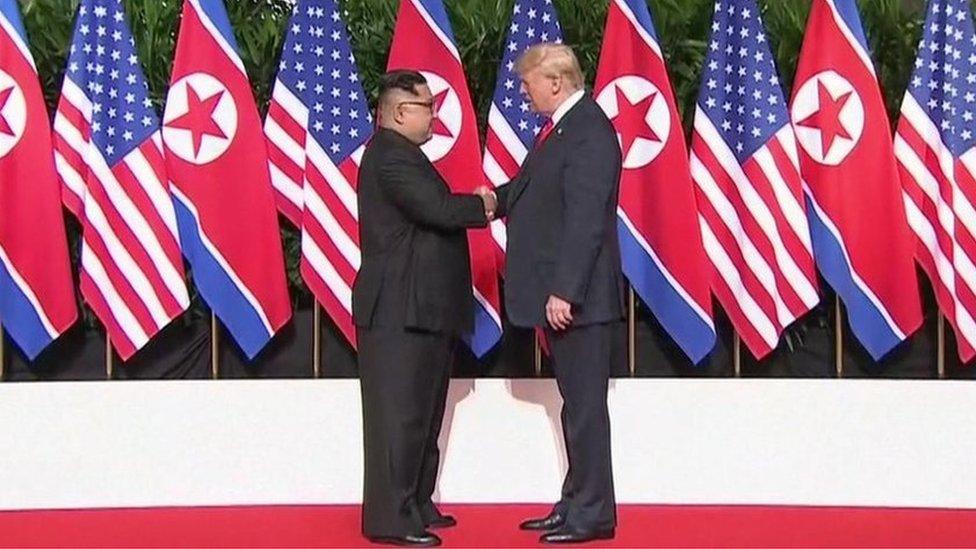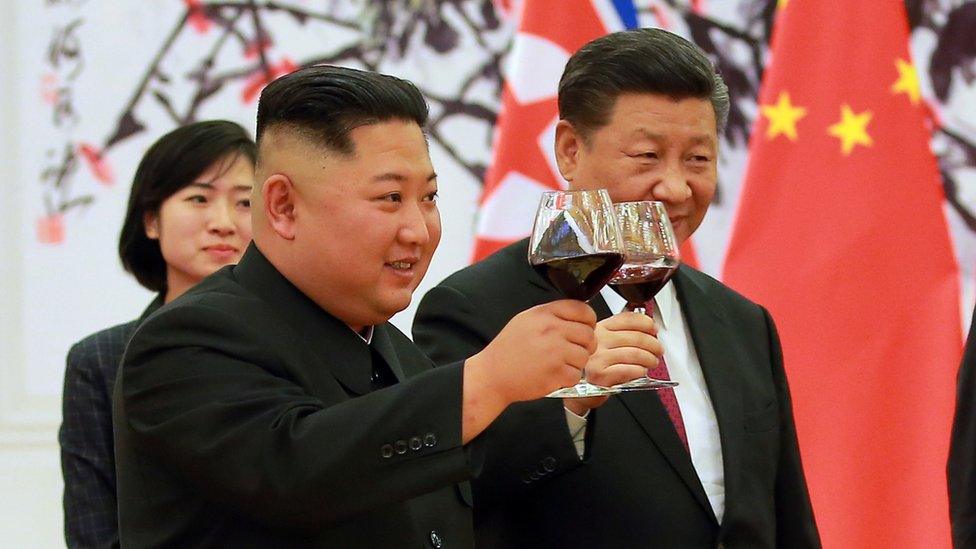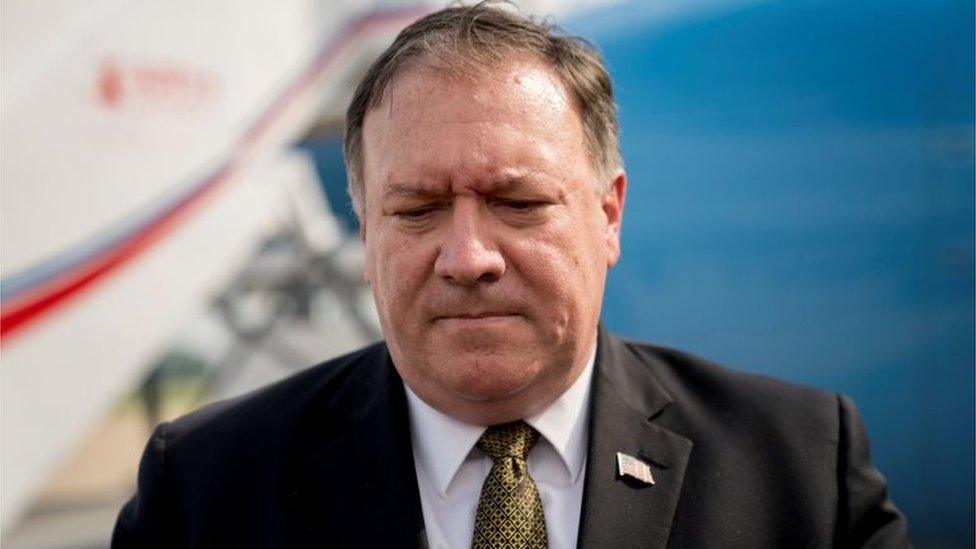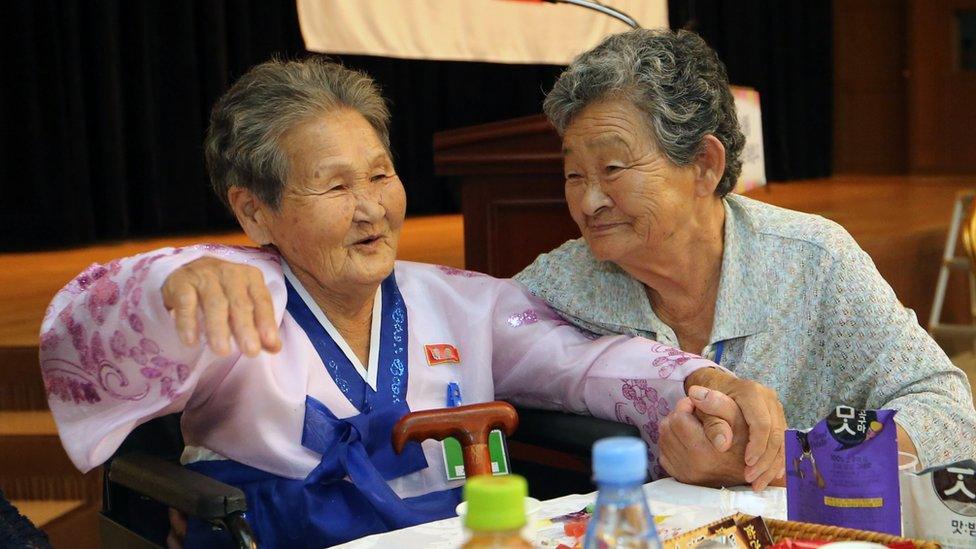US North Korea visit: China says Trump criticism is 'irresponsible'
- Published

Problem solved - according to Mr Trump after his June summit with Kim Jong-un
China has said it is "irresponsible" of President Trump to suggest it was not putting enough pressure on North Korea over its nuclear programme.
Mr Trump had tweeted that China was "not helping" because of trade tensions with the US.
A Chinese foreign ministry spokesman said this was "contrary to basic facts" and China was "seriously concerned".
On Thursday Mr Trump called off US Secretary of State Mike Pompeo's planned trip to North Korea.
He said that insufficient progress was being made in dismantling Pyongyang's nuclear programme.
Allow X content?
This article contains content provided by X. We ask for your permission before anything is loaded, as they may be using cookies and other technologies. You may want to read X’s cookie policy, external and privacy policy, external before accepting. To view this content choose ‘accept and continue’.

After his summit with the North Korean leader in June, Mr Trump said the country was no longer a nuclear threat.
But since then there have been several reports that it is failing to dismantle its nuclear facilities.
One of the most recent warnings came from unnamed US officials, who told the Washington Post that North Korea appeared to be building new intercontinental ballistic missiles.
The UN's nuclear agency (IAEA) has also said North Korea is continuing with its nuclear programme.
Meanwhile the second in a new series of family reunions for North and South Koreans separated by the war 65 years ago has taken place in a North Korean tourist resort.
Some 326 South Koreans from 81 families met their long-lost relatives, external, South Korea's Yonhap news agency reported.
What is the US-China trade issue?
Beijing is Pyongyang's only significant ally and Washington's most powerful long-term strategic rival in the region.
The two powers are currently embroiled in a tit-for-tat tariff war after Mr Trump complained about the size of the US trade deficit with China and what Washington sees as other unfair trade practices.
Each side has now imposed 25% tariffs on a total of $50bn of one another's goods.

North Korea's Mr Kim (L) visited China's Xi Jinping (R) after his summit with Mr Trump
However, only three days ago Mr Trump said China had been a "big help on North Korea".
North Korean leader Kim Jong-un has visited Chinese leader Xi Jinping several times this year, including a visit shortly after his summit with Mr Trump.
What is Mr Trump's latest line?
Mr Pompeo was due to head to Pyongyang next week with his newly appointed special envoy for North Korea - Stephen Biegun, a retiring Ford executive.
It would have been the secretary of state's fourth trip, though he was not expected to meet Mr Kim.
Mr Pompeo might still make another trip though.
Allow X content?
This article contains content provided by X. We ask for your permission before anything is loaded, as they may be using cookies and other technologies. You may want to read X’s cookie policy, external and privacy policy, external before accepting. To view this content choose ‘accept and continue’.
How much of a shift is this?
"There is no longer a nuclear threat from North Korea," Mr Trump tweeted on arriving back in the US from the June summit with Mr Kim in Singapore.
"Everybody can feel much safer," he said.
After the optimism of Singapore, the latest development might seem like quite a change.

Mike Pompeo during his last visit in July
But there have been ups and downs in the Trump-North Korea relationship since then.
After a visit by Mr Pompeo in July, North Korea condemned his "gangster-like demands", only for another trip to be announced, albeit now cancelled.
And the summit itself was called off in May - Mr Trump citing Pyongyang's "open hostility" - only for it to take place after all.
The US has made clear that it wants to see an end to the North's nuclear activities before it will consider lifting economic sanctions.

These sisters living in North and South Korea were reunited after more than six decades
The summit was seen as possible turning point after a ratcheting up of tensions.
North Korea had carried out a sixth nuclear bomb test in September last year and boasted of its ability to launch a missile at the United States.